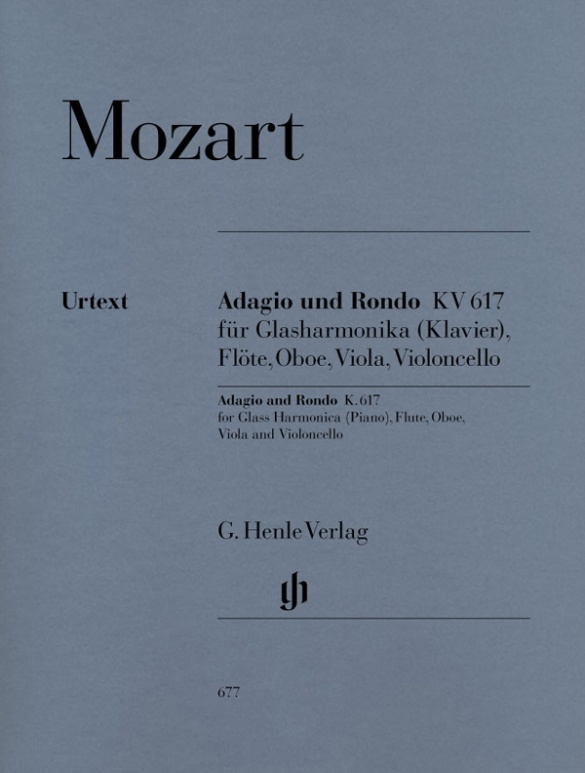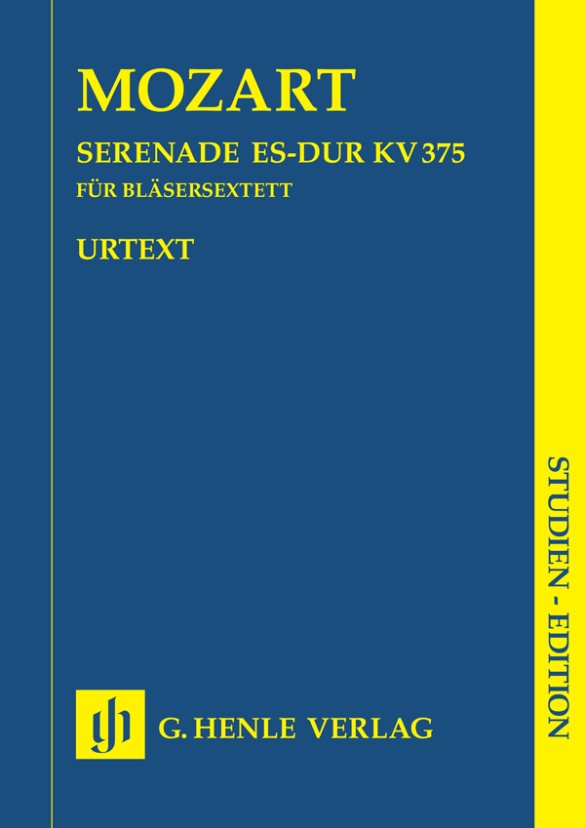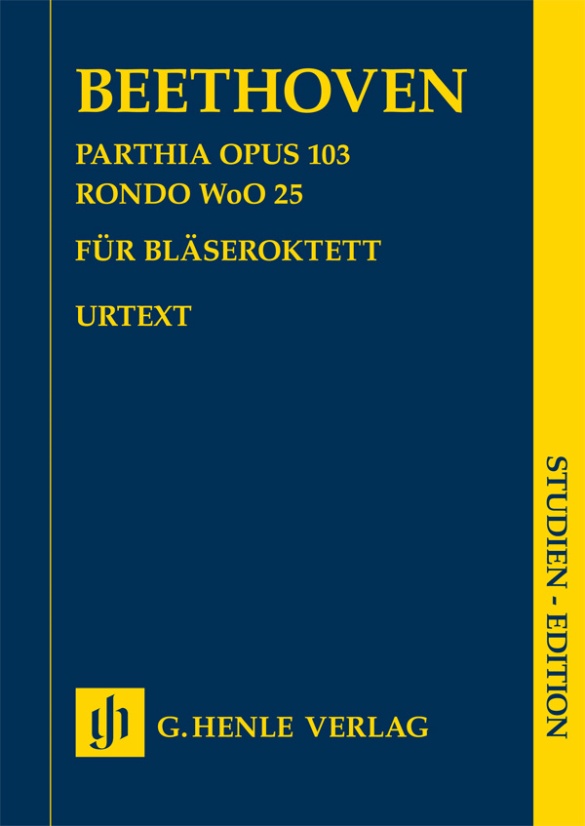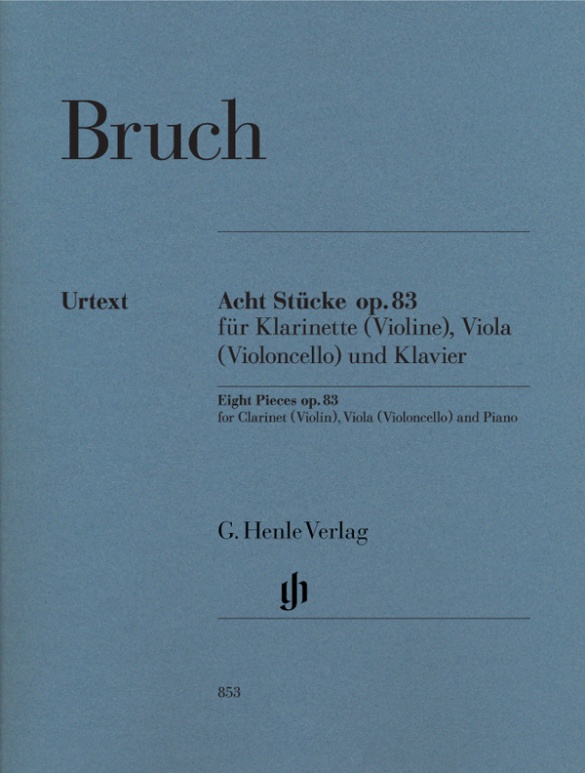

Max Bruch
Eight Pieces op. 83 for Clarinet (Violin), Viola (Violoncello) and Piano
Max Bruch composed these eight, highly romantic pieces for his son Max Felix, a talented clarinettist. In order to enable the work to be played more widely, Bruch arranged the clarinet part for violin and the viola part for cello.
Our edition contains both parts plus a transposed version for clarinet in B flat, thus allowing it to be played by different combinations of instruments. In addition, all of the eight pieces are presented here in an Urtext edition for the first time and in one volume!
Content/Details
About the Composer
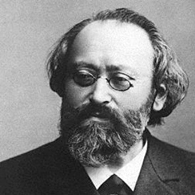
Max Bruch
A German composer of the Romantic period. Stylistically, his works outline a counter-aesthetic to the New German School. His violin concerti are particularly significant, but he also wrote numerous choral works, cantatas, oratorios, songs, stage works and orchestral pieces.
| 1838 | Born in Cologne on January 6. He received his first musical training from his mother, a singer. |
| from 1849 | Music instruction from Heinrich Carl Breidenstein. Writes many compositions even though still a child. |
| 1852 | Scholarship recipient of Frankfurt’s Mozart Foundation. |
| 1853–57 | Studies composition with Ferdinand Hiller in Cologne. |
| 1858 | Premiere in Cologne of his opera “Scherz, List und Rache” (“Jest, Cunning, and Revenge”), op. 1. |
| from 1858 | In Leipzig he associates himself with those around Mendelssohn. |
| 1862 | Moves to Mannheim. |
| 1863 | Premiere in Mannheim of his opera “Die Loreley,” op. 16. |
| 1865–67 | Music director in Koblenz. Composes his Violin Concerto no. 1 in G minor, op. 26. |
| 1867–70 | Court musical director in Sondershausen. Composes his Symphony no. 1 in E-flat major, op. 28, dedicated to Johannes Brahms, and Symphony no. 2 in F minor, op. 36 (both in 1870). |
| 1870–78 | Freelance composer in Berlin and Bonn. Composes the oratorio Odysseus, op. 41 (1871/72). |
| 1879/80 | Composition of the Fantasy in E-flat major, op. 46 (Scottish Fantasy) for violin and orchestra. |
| 1880–83 | Director of the Philharmonic Society in Liverpool. |
| from 1883 | Travels to the United States. Director of the Breslauer Orchesterverein (Wrocław Orchestral Society). |
| from 1891 | Director of the composition masterclass at the Berlin Academy of the Arts. Honorary doctorate from Cambridge University (1893), and membership of the Académie des Beaux Arts (1898). |
| 1907 | Vice-President of the Academy of the Arts, Berlin. |
| 1920 | Dies in Berlin on October 2. |
About the Authors
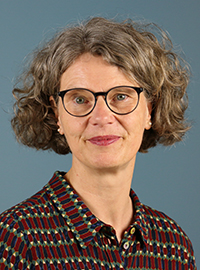
Annette Oppermann (Editor)
Dr. Annette Oppermann, born in 1965, trained as a music dealer in Frankfurt am Main and studied historical and systematic musicology as well as modern German literature at Hamburg University.
From 1993 to 1996 she worked as an editor for Sony Classical International in Hamburg; from 1996 to 1999 she was a doctoral candidate in the postgraduate programme Textkritik at the Ludwig-Maximilians-Universität in Munich, in January 2000 she earned her doctorate with a dissertation on “Musikalische Klassikerausgaben” (Hans-Joachim Marx, Hamburg). From 2000 to 2008 she worked as a research associate at the Joseph Haydn-Institut in Cologne, and was editor of the Oratorio “Die Schöpfung” in the Complete Edition of Joseph Haydn’s Works. Since February 2008 she has been an editor at G. Henle Publishers in Munich, with a particular focus on vocal music, chamber music and books.

Klaus Schilde (Fingering)
Prof. Klaus Schilde, born in 1926, spent his childhood in Dresden. There he was greatly influenced by Walter Engel, who taught him the piano (Kodaly method), composition and violin. From 1946–1948 he studied at the music conservatory in Leipzig with Hugo Steurer. After moving to the west in 1952 he studied with Walter Gieseking and Edwin Fischer, as well as with Marguerite Long, Lucette Descaves and Nadia Boulanger in Paris.
Schilde won numerous prizes. From 1947 onwards he gave concerts as a soloist and chamber musician on almost every single continent with renowned orchestras. He taught at the music conservatories in East Berlin Detmold, West Berlin, Munich, Tokyo (Geidai) and Weimar. From 1988–1991 he was President of the Staatliche Hochschule für Musik und Theater in Munich, where he also taught for decades as a professor. There are numerous radio and television broadcasts with Klaus Schilde as well as CD recordings. Schilde has contributed fingerings to almost 100 Henle Urtext editions.
Prof. Klaus Schilde passed away on 10 December, 2020.
Product Safety Informations (GPSR)

G. Henle Verlag
Here you can find the information about the manufacturer of the product.G. Henle Verlag e.K.
Forstenrieder Allee 122
81476 München
Germany
info@henle.de
www.henle.com
Der Henle Verlag hat die acht Stücke jetzt als Urtext neu veröffentlicht und damit eine wichtige „Versorgungslücke“ geschlossen. … hat die Henle-Ausgabe eine ganze Reihe von Vorteilen, die sie für die Zukunft sicherlich konkurrenzlos machen dürfte: Zum einen versammelt sie erstmals alle acht Stücke zusammenhängend in einem Band – bisher waren die Nummern nur als Einzelausgaben zu haben, was insbesondere bei einer kompletten Aufführung ziemlich unpraktisch war. Zum anderen hat sich dadurch der Preis nicht etwa erhöht, sondern glatt halbiert.… Schließlich glänzt Henle einmal mehr mit der gewohnten Sorgfalt seiner Urtext-Ausgaben: Das Druckbild ist gegenüber der Erstausgabe deutlich verbessert, zusätzlich zu den Studierziffern gibt es jetzt auch Taktzahlen und praktikablere Wendestellen. Und natürlich bewegt sich die Aufarbeitung des Notentextes auf beispielhaft hohem Niveau.
Das Orchester, 2010Hier ist eine wirklich sehr erfreuliche Neuausgabe dieses bezaubernden kammermusikalischen Bruchschen Spätwerks gelungen, sowohl inhaltlich wie auch optisch, und aufgrund besserer Blätterstellen – gegenüber der Simrock-Erstausgabe – für den Pianisten sogar praktisch. … Wieder einmal erschien bei Henle eine sehr zu empfehlende Neuausgabe eines „Klassikers“ (eigentlich eines Spät- nein: Nachromantikers), die obendrein auch preislich interessant ist.
Liebhaberorchester, 2009recommendations
autogenerated_cross_selling
Further editions of this title
Further editions of this title


